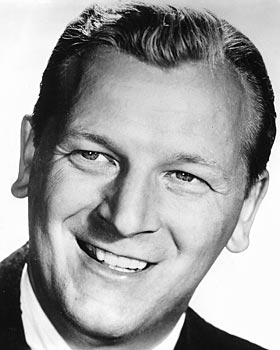
Leslie Thompson Baxter was an American musician, composer and conductor. After working as an arranger and composer for swing bands, he developed his own style of easy listening music, known as exotica and scored over 250 radio, television and motion pictures numbers.
Martin Denny was an American pianist, composer, and arranger. Known as the "father of exotica," he was a multi-instrumentalist and could play a number of percussion instruments. In a long career that saw him performing up to 3 weeks prior to his death, he toured the world popularizing his brand of lounge music which included exotic percussion, imaginative rearrangements of popular songs, and original songs that celebrated Tiki culture.
Arthur Lyman was a Hawaiian jazz vibraphone and marimba player. His group popularized a style of faux-Polynesian music during the 1950s and 1960s which later became known as exotica. His albums became favorite stereo-effect demonstration discs during the early days of the stereophonic LP album for their elaborate and colorful percussion, deep bass and 3-dimensional recording soundstage. Lyman was known as "the King of Lounge music."
Exotica is a musical genre, named after the 1957 Martin Denny album of the same name that was popular during the 1950s to mid-1960s with Americans who came of age during World War II. The term was coined by Simon "Si" Waronker, Liberty Records co-founder and board chairman. The musical colloquialism exotica means tropical ersatz, the non-native, pseudo experience of insular Oceania, Southeast Asia, Hawaii, the Amazon basin, the Andes, the Caribbean and tribal Africa. Denny described the musical style as "a combination of the South Pacific and the Orient...what a lot of people imagined the islands to be like...it's pure fantasy though." While the South Seas forms the core region, exotica reflects the "musical impressions" of every place from standard travel destinations to the mythical "shangri-las" dreamt of by armchair safari-ers.
Lounge music is a type of easy listening music popular in the 1950s and 1960s. It may be meant to evoke in the listeners the feeling of being in a place, usually with a tranquil theme, such as a jungle, an island paradise or outer space. The range of lounge music encompasses beautiful music-influenced instrumentals, modern electronica, while remaining thematically focused on its retro-space age cultural elements. The earliest type of lounge music appeared during the 1920s and 1930s, and was known as light music.
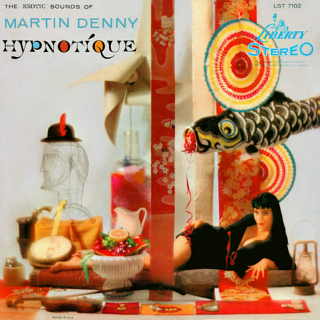
Hypnotique is the fifth album by Martin Denny. Released on Liberty Records in 1959, it was recorded in 1958 at the Kamehameha Schools auditorium and at the Liberty Studios in Hollywood.

Birdland is a studio album by the reconstituted English rock group the Yardbirds, which was released in 2003, and the band's fifth studio album overall. Original drummer Jim McCarty and rhythm guitarist Chris Dreja reformed the group in 1994 and, for the album, the Yardbirds lineup included lead singer and bassist John Idan, lead guitarist Gypie Mayo, and harmonica player Alan Glen. The album features contributions by several guests, including Joe Satriani, Steve Vai, Slash, Brian May, and original group guitarist Jeff Beck.
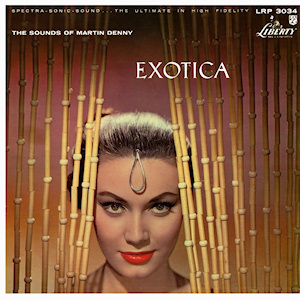
Exotica is the first album by Martin Denny, released in 1957. It contained Les Baxter's most famous piece, "Quiet Village", and spawned an entire genre bearing its name. It was recorded December 1956 in Webley Edwards' studio in Waikiki. The album topped Billboard's charts in 1959.

Exotica Volume II was the second album by Martin Denny, released in 1958.
The Baja Marimba Band was an American musical group led by marimba player Julius Wechter. Formed by producer Herb Alpert after his own Tijuana Brass, the Baja Marimba Band outlasted the Tijuana Brass by several years in part due to TV producer Chuck Barris, who included the group's music on his game shows in the 1970s.
Julius Wechter was an American musician and composer who played the marimba and vibraphone. He also played various percussion instruments. He composed the song "Spanish Flea" for Herb Alpert and was leader of the Baja Marimba Band.
Gene Rains is a vibraphonist and leader of the Gene Rains Group, a jazz quartet from Hawaii that played a musical style known as Exotica. Rains' short career spanned the early to the mid-1960s and consisted of 4 LP recordings released on Decca Records and the Vocalion label. These LPs were released during the golden era of Hawaiian and Exotica music and the Tiki culture in the United States. The Gene Rains Group repertoire featured popular Hawaiian and Polynesian Island melodies as well as popular American tunes of the era.
"Quiet Village" is an orchestral pop instrumental that was written and originally performed by Les Baxter in 1951 and an instrumental album from 1959 by Martin Denny. In the liner notes to his album, Ritual of the Savage , Baxter described the themes he was conveying in the work:
[t]he jungle grows more dense as the river boat slowly makes its way into the deep interior. A snake slithers into the water, flushing a brilliantly plumaged bird who soars into the clearing above a quiet village. Here is a musical portrait of a tropical village deserted in the mid-day heat.

Takeshi "Tak" Shindo was an American musician, composer and arranger. He was one of the prominent artists in the exotica music genre during the late 1950s and early 1960s. Shindo also founded a dance band in 1947 and was a frequent lecturer and writer on Japanese music. He first gained prominence for his work on the 1957 motion picture Sayonara, served as the musical director for the television series Gunsmoke, and composed theme music for The Ed Sullivan Show and Wagon Train. He is most remembered for the exotica albums he released from 1958 to 1962, including Mganga! The Primitive Sounds of Tak Shindo (1958), Brass and Bamboo (1959) and Accent on Bamboo (1960). He also released several albums in Japan during the mid-1960s that blended American and Japanese musical traditions. During the 1950s and 1960s, Shindo was a columnist for the Rafu Shimpo covering classical and popular music. In 1980, Shindo made a documentary film, Encounter with the Past, about the Manzanar relocation camp where he was relocated in 1942 as part of the Japanese American internment policy.

Orienta is an album by The Markko Polo Adventurers released in 1959. The album was produced by Simon Rady, arranged and conducted by Gerald Fried and recorded in stereo in Hollywood, California. The album uses a combination of sound effects and Asian-inspired music to tell humorous vignettes. Its suggestive cover art features a photograph by Murray Laden.
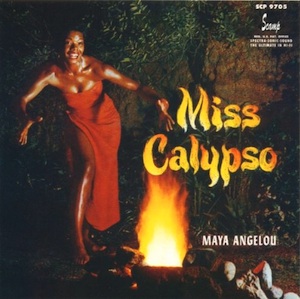
Miss Calypso is the debut and only studio album by American writer and poet Maya Angelou, released in 1957. The album was released during a craze for calypso music catalyzed by Harry Belafonte the previous year. Angelou sings every song on the album, and she composed five of them. Behind Angelou's voice, studio guitarist Tommy Tedesco and percussionist Al Bello created an exotic mood. Angelou toured in support of the album, performing calypso songs in nightclubs. The album was a modest success but Angelou did not make any further records as a singer.
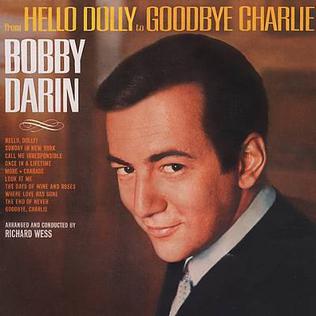
From Hello Dolly to Goodbye Charlie is a 1964 album by Bobby Darin. The album was arranged and conducted by Richard Wess.

Quiet Village: The Exotic Sounds of Martin Denny was the eighth album by Martin Denny. Released in the summer of 1959, the monophonic version of the album reached No. 21 on the Billboard monophonic album chart in November 1959, and the stereophonic version reached No. 12 on the magazine's stereophonic album chart in January 1960.
Primitiva (LRP-3087/LST-7023) was the fourth album by Martin Denny. Released in August 1958, it was recorded at Liberty Studios in Hollywood and released on Liberty Records. In October 1958, it reached No. 27 on the national Cashbox chart.
August "Augie" Borero Colon was an American musician known for his work as a percussionist in the exotica genre. He came to national fame as a member of Martin Denny's band in the 1950s and was the voice behind the bird calls and jungle sounds of the hit single "Quiet Village". He also recorded two solo albums, Sophisticated Savage (1959) and Chant of the Jungle (1960). In the early 1960s, Colon left Denny's group and toured with his own band known as The Tropicales.










